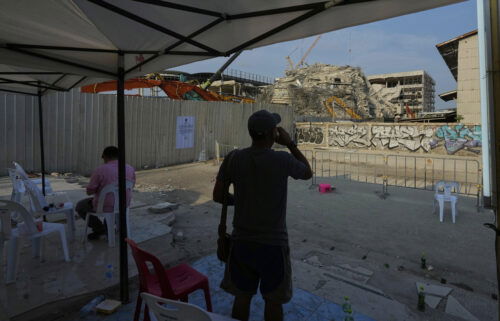The delicate dance to preserve the magic of Abbey Road’s legendary Studio One

By HILARY FOX
Associated Press
LONDON (AP) — In Abbey Road’s Studio One, even a lick of paint could ruin everything.
Famous for hosting Adele, Harry Styles and U2, it’s where the scores of “Star Wars,” “Harry Potter” and “Wicked” were recorded, as well as the soundtracks of blockbuster games like “Call of Duty,” “Halo” and “Final Fantasy.” It’s also where Ryan Gosling delivered his memorable “I’m Just Ken” for “Barbie.”
Nearly a century after its opening, Studio One underwent a six-month, multimillion-pound refurbishment, with the main priority being the preservation of one very important thing: the sound.
“What we don’t want to do is change the acoustics, so every minute detail in the room has been conserved and preserved, so the sound doesn’t shift,” said Sally Davies, managing director of Abbey Road Studios.
The reverb of the 4,844-square-foot (450-square-meter) room has been maintained at 2.3 seconds, the same as it was in the 1970s. There’s been no redecorating or style makeover, leaving the original Art Deco wall panels untouched.
“We have simply washed down the walls to preserve that sound,” said Davies, adding that the floor was re-sanded and oiled, but not varnished. Most of the upgrades, she explained, are technological upgrades in the control room. “This room is just about preserving that magic.”
A pilgrimage for music fans
Opened in 1931, this hallowed hall — once a nine-bedroom house on a grand suburban street in London’s St. John’s Wood neighborhood — became the world’s first recording studio. It’s where stereo was invented and it’s visited every day by music fans from around the world, who are happy just to stand on the street outside.
Davies says that more than a million people a year make a pilgrimage to the crossing outside, many to recreate the cover of The Beatles’ “Abbey Road” album — and that number could increase after Sam Mendes’ upcoming biopics starring Paul Mescal, Barry Keoghan, Harris Dickinson and Joseph Quinn as the Fab Four.
And while John Lennon, Paul McCartney, George Harrison and Ringo Starr are famously known for using Studio Two, they also made history in the larger Studio One, which they used for the world’s first global live performance, a rendition of “All You Need Is Love” beamed to television sets around the world in 1967.
Before The Beatles, Studio One had already cemented its place in music history, when it was opened by British composer Sir Edward Elgar, who recorded his “Land of Hope and Glory” with the London Symphony Orchestra. It’s also hosted other music greats like Maria Callas, Igor Stravinsky, Daniel Barenboim, Fats Waller and Glenn Miller.
Due to its huge size, more than double Studio Two, it can fit a 100-piece orchestra and 100-member choir at the same time — which is perfect for recording film soundtracks, and explains why six to seven out of every 10 Hollywood films are scored at Abbey Road, according to the studio.
History being made
Standing on the balcony, overlooking the 40-foot-high (12-meter-high) room, Davies points out the original screen that was used to show “Raiders of the Lost Ark” (1981) while musicians played along to record the soundtrack.
Since then, everything from “The Lord of the Rings” trilogy to Marvel’s “Black Panther” and “Guardians of the Galaxy” to “Barbie” were scored in Studio One. For the last, all the musicians came in with something pink, whether a pink instrument or piece of clothing.
Oscar-nominated composer Daniel Pemberton has been recording in Studio One since 2009 and calls his “creative home” a “spectacular space.”
“Outside, it just looks like a normal house. And then you come in and you find this space in it that’s like almost the size of a football pitch. In fact, I have played football in there once,” he laughs.
Pemberton is known for scoring “Spider-Man: Across the Spider Verse,” “Ferrari,” “The Trial of the Chicago 7” and creating the “Slow Horses” theme song and “Strange Game,” with Mick Jagger.
“What’s so exciting about a room like Studio One is what happens on the day is what happens for the rest of time,” he says. “It’s like history is being made, whether it’s good history or bad history or whatever, you’re making a moment then.”
Pemberton notes the stories, whether personal or musical, that have unfolded within the walls of Studio One.
“The ghosts are insane in there,” he said.
Davies agrees that the history adds to the enchantment.
“You walk into this room and you can feel it. … There is a magic in the sound. It sounds phenomenal. There is a spirituality in who has been here, who has performed here,” she says. “So when we see artists come through, you know that immediate reaction of, ‘Oh my gosh. I’m in Studio One.’”
To celebrate the reopening this week, Abbey Road Studios showcased an unusual art form for the space: dance, which incorporated Pemberton’s scores, remixed by resident artist Jordan Rakei and choreographed by Joseph Toonga.
“It kind of like threw me back a bit like, wow, it really is big,” said Toonga of the first time he saw the studio. He then incorporated that feeling into a dance which spanned hip-hop, krumping and ballet.
Up next, the first client to record in Studio One since the refurbishment is a hush-hush Hollywood franchise.
But there are lots of secrets at Abbey Road. One of them is Pemberton’s plan to record the unique rattling sound of the new railings for a movie soundtrack.
There was concern that the hollow, Art Deco-style bars would upset the acoustics of the room, and a backup plan was made to fill them with sand if they messed with the reverb.
Luckily, the empty bars were allowed to stay because Pemberton is delighted by the noise they make when you run past them with keys — it’s another dramatic sound that can only be created in Studio One and will make its way into theaters around the world, via a film score.
___
This story has been corrected to show that Studio One can fit a 100-piece orchestra and 100-member choir at the same time, not 110 each, and that the managing director is named Sally Davies, not Sally Davis.



